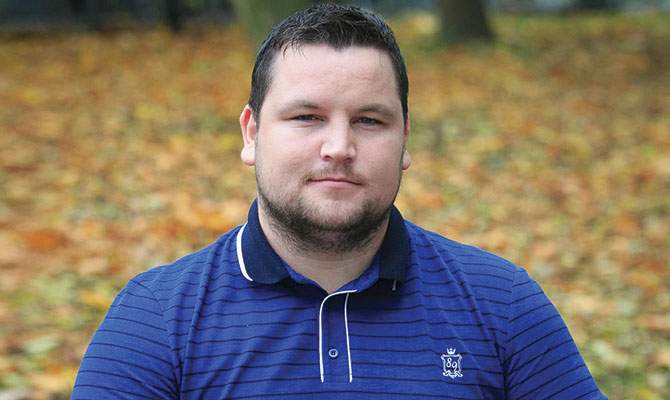
Braving the storm

With the benefit of hindsight, we can admit that perhaps we overreacted, that there was really no need to buy twelve kilos of potatoes, an entire cow, and six heads of cabbage. That if we’d just taken it easy there’d have been enough for everyone. And if we hadn’t lost our minds we wouldn’t be sheepishly leaving out extra bags of rubbish for the lads to collect on their designated night.
Still though, you can’t ever be too careful, and sure we weren’t we warned by no less an authority than the Taoiseach himself?
Stay in, he said, don’t even attempt to go out the door. And although Leo’s warning only extended to the following day, we weren’t taking any chances. We’d seen the films, we knew how this went; one minute you’re pottering down to the newsagents for a sliced pan, the next you’re wild-eyed and ravenous, tussling with Mrs Finucane for the last tin of dog food.
So, we stocked up, we bought enough to last us through the apocalypse. And when, just a day later, the shops reopened, we did the same again, elbowing children out the way to get the last carton of eggs. Only when the snow had fully melted, when we were 100% certain we weren’t going to spend the rest of our lives barricaded indoors, did we relax, celebrating the news with another round of toast and a few pints of milk. I wouldn’t mind but it hardly even snowed in Limerick, a few inches and then the rain came to restore order.
The rest of the country though, the south-east, the midlands, they’re still recovering, buoyed no doubt by Leo’s prediction that they’ll find a load of dead bodies once they clear the white stuff away. Because that’s how he views life outside of the capital, like something from a Dickensian novel, where only the grace of God and the occasional bowl of broth get us from one day to the next.
In reality, rural Ireland did what it always does during a crisis, it pulled together, the community spirit, which some fear we’ve lost, coming to the fore as the elderly and infirm were protected, cared for by people who could just as easily have been sat at home by the fire.

I must admit though, I’ve always dreamed of doing some looting. Yes, yes, I know, there’s people’s livelihoods at stake, insurance companies to consider, and all that other sensible stuff, but come on, who among you hasn’t fantasised about waking up one morning to find everyone gone, strolling down a deserted high street and heading straight into that store with all the expensive, designer-brand clothes; helping yourself, trying stuff on right there in the middle of the shop-floor, walking round in your undies till you find your exact fit.
Lidl though, there’s not too many designer-brands in there. But when it comes to looting, beggars really can’t be choosers; everything is free after all. That the main purpose of this escapade, to break into the store’s safe, proved unsuccessful, is but a mere side-note; this was Ireland as it would be at the end of days, and terrifying it was too.
In the aftermath, discourse centred around what you could and couldn’t call the people responsible for this crime: Scumbag was deemed inappropriate, a little too coarse, too loaded with hidden meaning. Horrible little toe-rags was mooted but rejected for the same reasons. In the end, we decided that they were very naughty boys and left it at that.
Except we didn’t leave it at that. Without any real-life criminals to harangue, to name-call and chastise, we needed a live target, someone to bear the brunt of our outrage, someone who wouldn’t fight back.
And as luck would have it, a man on the rise, a man from a minority group which hardly ever speaks up for itself, put himself forth. Upon winning Best Actor at the recent Irish Film and Television Awards (IFTA), John Connors chose not to thank every person he’d ever met, nor did he weep tears of gratitude for being lucky enough to receive his award. No, instead he highlighted the difficulties he’s faced acquiring an agent, how filmmakers and directors have continually ignored him because he’s a Traveller.
His speech went viral, Mr Connors was lauded, praised to the hilt. But even then, you knew, you knew that some people weren’t happy, that they didn’t like seeing someone from the Traveller community getting uppity, that, first chance they got, they’d be bringing this fella down a peg or two.
And so, it was.

It was a stupid thing to say, the kind of thing you’d joke about with your mates, the kind of thing a left-wing radical might tweet to his nineteen followers. Unfortunately for John Connors, he has a lot more followers than that.
Before he knew it, Mr Connors was in the middle of a storm far more severe than any eastern beast called Emma. He quickly deleted the tweet. But it was too late. The hounds were on him. The more measured among them suggested that this was the end of his career, that he’d had his fun but now it was time to get back in the caravan and find a new halting site.
Others opined that he was reverting to type, that, as a Traveller, he was well-versed in the arts of crime, that the only surprise was he wasn’t in there himself, robbing anything which wasn’t nailed down. And then there were those who’d been waiting, those who could hardly believe it’d only taken him a couple of weeks to slip up.
Their comments, their replies, aren’t worth repeating. Rarely, if ever, am I surprised by the level of vitriol spewed forth on the Internet – some people use it solely for that purpose – but in the case of John Connors the punishment was in no way befitting of the crime.
He was subjected to vicious, discriminatory abuse, to every racial stereotype going, to a barrage of insults which, if directed at a member of any other minority group, would have the PC brigade out in full, riding in on their rainbow chariots to save another helpless soul.
But Mr Connors stood alone, the handful of tweets calling for a bit of decorum drowned out by the white noise. It may have been a once-in-a-generation weather event, a blast of snow unlike anything many of us had seen before, but for one man, for one community, it was just another day on the margins of society, a day like all the rest.
For the love of the game

Spotting the one niche they haven’t yet filled, they’ve been busily promoting ladies’ football, ladies’ rugby, and a variety of female sports which, at one time, wouldn’t have got near our TV screens. So determined are some British broadcasters to promote gender equality, they’ve introduced female pundits into male sports, heartily clapping themselves on the back as they do so.
In Ireland we’ve always been more open-minded about women’s sport. When our ladies’ rugby team won the Grand Slam we celebrated it like it were, if not the men’s team, then at least the next best thing. When Stephanie Roche was nominated for FIFA’s Goal of the Year we, like the fools that we are, tuned into Sepp Blatter’s gala event in the hope she might win it. And year after year, the viewing figures for both camogie and ladies’ Gaelic football continue to rise.
Therefore, it comes as no surprise that 36 per cent of Irish people have attended or watched a women’s sporting event in the past year. And because more men watch sport than women it’s not really all that surprising that 43 per cent of Irish men attended or watched women’s sport in the past year. And I suppose it’s not all that strange that women’s sport is most popular among men over the age of 55 (57 per cent).
Because aul lads love sport, don’t they? And they’d only ever be watching the women play out of genuine enthusiasm and curiosity. Wouldn’t they?










